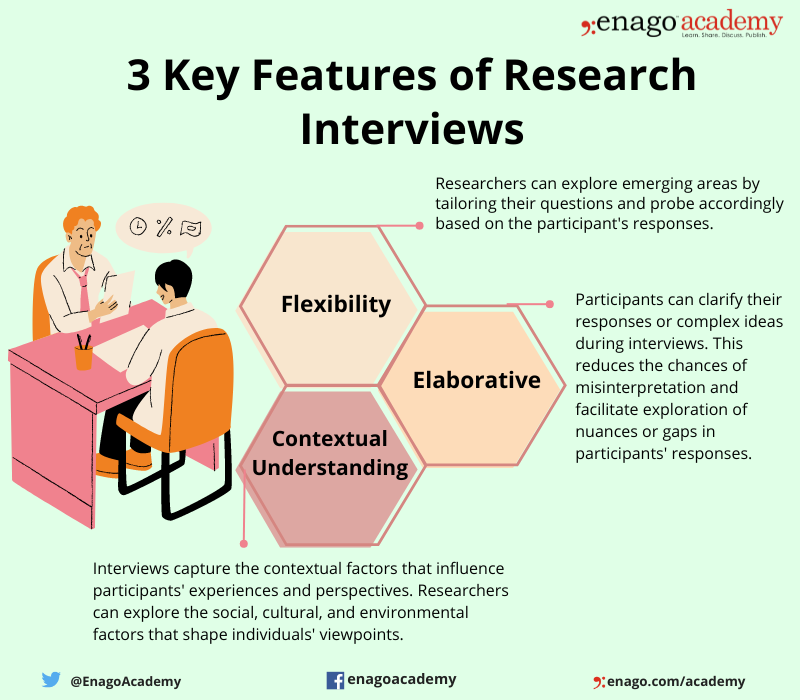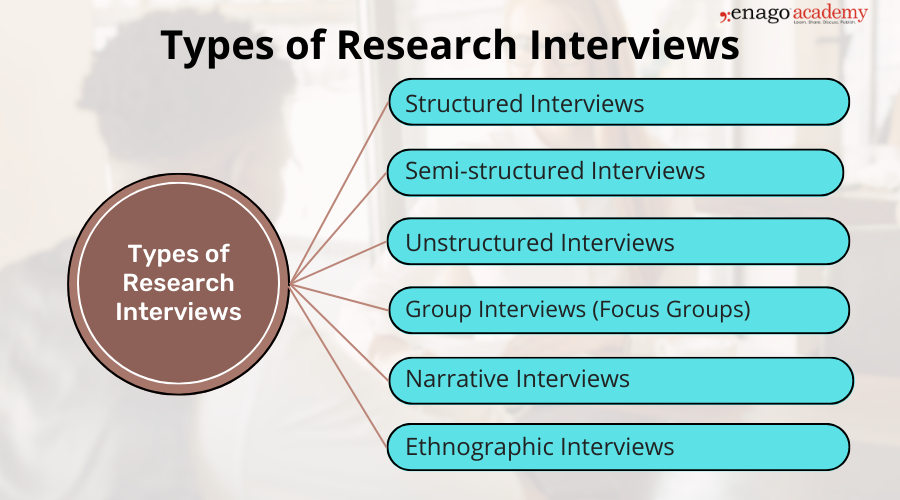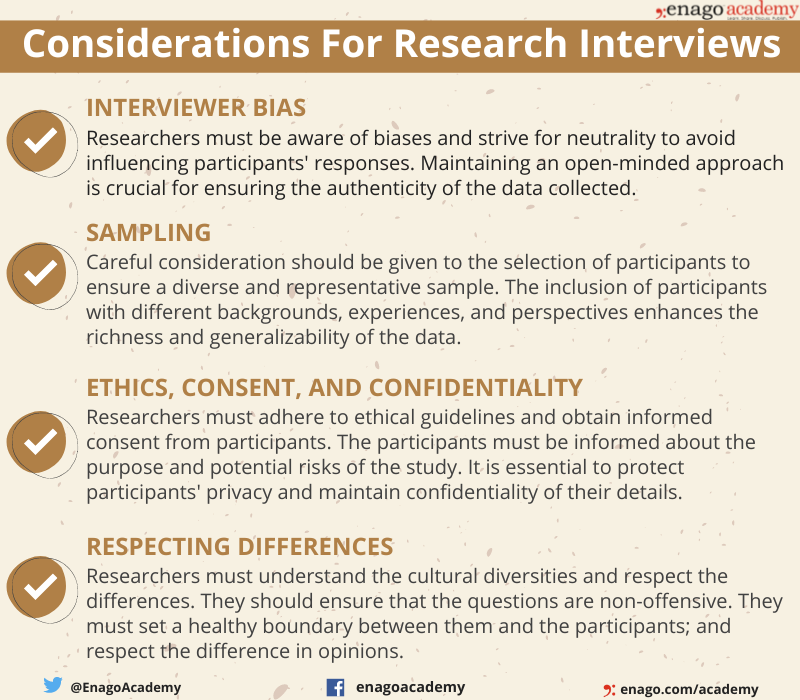Research Interviews: An effective and insightful way of data collection

Research interviews play a pivotal role in collecting data for various academic, scientific, and professional endeavors. They provide researchers with an opportunity to delve deep into the thoughts, experiences, and perspectives of an individual, thus enabling a comprehensive understanding of complex phenomena. It is important for researchers to design an effective and insightful method of data collection on a particular topic. A research interview is typically a two-person meeting conducted to collect information on a certain topic. It is a qualitative data collection method to gain primary information.
The three key features of a research interview are as follows:

The Significance of Research Interviews in Gathering Primary Data
The role of research interviews in gathering first-hand information is invaluable. Additionally, they allow researchers to interact directly with participants, enabling them to collect unfiltered primary data.

1. Subjective Experience
Research interviews facilitate in-depth exploration of a research topic. Thus, by engaging in one-to-one conversation with participants, researchers can delve into the nuances and complexities of their experiences, perspectives, and opinions. This allows comprehensive understanding of the research subject that may not be possible through other methods. Also, research interviews offer the unique advantage of capturing subjective experiences through personal narratives. Moreover, participants can express their thoughts, feelings, and beliefs, which add depth to the findings.
2. Personal Insights
Research interviews offer an opportunity for participants to share their views and opinions on the objective they are being interviewed for. Furthermore, participants can express their thoughts and experiences, providing rich qualitative data. Consequently, these personal narratives add a human element to the research, thus enhancing the understanding of the topic from the participants’ perspectives. Research interviews offer the opportunity to uncover unanticipated insights or emerging themes. Additionally, open-ended questions and active listening can help the researchers to identify new perspectives, ideas, or patterns that may not have been initially considered. As a result, these factors can lead to new avenues for exploration.
3. Clarification and Validation
Researchers can clarify participants’ responses and validate their understanding during an interview. This ensures accurate data collection and interpretation. Additionally, researchers can probe deeper into participants’ statements and seek clarification on any ambiguity in the information.
4. Contextual Information
Research interviews allow researchers to gather contextual information that offers a comprehensive understanding of the research topic. Additionally, participants can provide insights into the social, cultural, or environmental factors that shape their experiences, behaviors, and beliefs. This contextual information helps researchers place the data in a broader context and facilitates a more nuanced analysis.
5. Non-verbal Cues
In addition to verbal responses, research interviews allow researchers to observe non-verbal cues such as body language, facial expressions, and tone of voice. Additionally, non-verbal cues can convey information, such as emotions, attitudes, or levels of comfort. Furthermore, integrating non-verbal cues with verbal responses provides a more holistic understanding of participants’ experiences and enriches the data collection process.
Research interviews offer several advantages, making them a reliable tool for collecting information. However, choosing the right type of research interview is essential for collecting useful data.
Types of Research Interviews
There are several types of research interviews that researchers can use based on their research goals, the nature of their study, and the data they aim to collect. Here are some common types of research interviews:

1. Structured Interviews
- Structured interviews are standardized and follow a fixed format.
- Therefore, these interviews have a pre-determined set of questions.
- All the participants are asked the same set of questions in the same order.
- Therefore, this type of interview facilitates standardization and allows easy comparison and quantitative analysis of responses.
- As a result, structured interviews are used in surveys or studies which aims for a high level of standardization and comparability.
2. Semi-structured Interviews
- Semi-structured interviews offer a flexible framework by combining pre-determined questions.
- So, this gives an opportunity for follow-up questions and open-ended discussions.
- Researchers have a list of core questions but can adapt the interview depending on the participant’s responses.
- Consequently, this allows for in-depth exploration while maintaining some level of consistency across interviews.
- As a result, semi-structured interviews are widely used in qualitative research, where content-rich data is desired.
3. Unstructured Interviews
- Unstructured interviews provide the greatest flexibility and freedom in the interview process.
- This type do not have a pre-determined set of questions.
- Thus, the conversation flows naturally based on the participant’s responses and the researcher’s interests.
- Moreover, this type of interview allows for open-ended exploration and encourages participants to share their experiences, thoughts, and perspectives freely.
- Unstructured interviews useful to explore new or complex research topics, with limited preconceived questions.
4. Group Interviews (Focus Groups)
- Group interviews involve multiple participants who engage in a facilitated discussion on a specific topic.
- This format allows the interaction and exchange of ideas among participants, generating a group dynamic.
- Therefore, group interviews are beneficial for capturing diverse perspectives, and generating collective insights.
- They are often used in market research, social sciences, or studies demanding shared experiences.
5. Narrative Interviews
- Narrative interviews focus on eliciting participants’ personal stories, views, experiences, and narratives. Researchers aim to look into the individual’s life journey.
- As a result, this type of interview allows participants to construct and share their own narratives, providing rich qualitative data.
- Qualitative research, oral history, or studies focusing on individual experiences and identities uses narrative interviews.
6. Ethnographic Interviews
- Ethnographic interviews are conducted within the context of ethnographic research, where researchers immerse themselves in a specific social or cultural setting.
- These interviews aim to understand participants’ experiences, beliefs, and practices within their cultural context, thereby understanding diversity in different ethnic groups.
- Furthermore, ethnographic interviews involve building rapport, observing the participants’ daily lives, and engaging in conversations that capture the nuances of the culture under study.
It must be noted that these interview types are not mutually exclusive. Therefore, researchers often employ a combination of approaches to gather the most comprehensive data for their research. The choice of interview type depends on the research objectives and the nature of the research topic.
Steps of Conducting a Research Interview
Research interviews offer several benefits, and thus careful planning and execution of the entire process are important to gather in-depth information from the participants. While conducting an interview, it is essential to know the necessary steps to follow for ensuring success. The steps to conduct a research interview are as follows:
- Identify the objectives and understand the goals
- Select an appropriate interview format
- Organize the necessary materials for the interview
- Understand the questions to be addressed
- Analyze the demographics of interviewees
- Select the interviewees
- Design the interview questions to gather sufficient information
- Schedule the interview
- Explain the purpose of the interview
- Analyze the interviewee based on his/her responses
Considerations for Research Interviews
Since the flexible nature of research interviews makes them an invaluable tool for data collection, researchers must consider certain factors to make the process effective. They should avoid bias and preconceived notion against the participants. Furthermore, researchers must comply with ethical considerations and respect the cultural differences between them and the participants. Also, they should ensure careful tailoring of the questions to avoid making them offensive or derogatory. The interviewers must respect the privacy of the participants and ensure the confidentiality of their details.

By ensuring due diligence of these considerations associated with research interviews, researchers can maximize the validity and reliability of the collected data, leading to robust and meaningful research outcomes.
Have you ever conducted a research interview? What was your experience? What factors did you consider when conducting a research interview? Share it with researchers worldwide by submitting your thought piece on Enago Academy’s Open Blogging Platform.
Frequently Asked Questions
• Identify the objectives of the interview
• State and explain the purpose of the interview
• Select an appropriate interview format
• Organize the necessary materials for the Interview
• Check the demographics of the participants
• Select the Interviewees or the participants
• Prepare the list of questions to gather maximum useful data from the participants
• Schedule the Interview
• Analyze the participant based on his/ her Responses
Interviews are important in research as it helps to gather elaborative first-hand information. It helps to draw conclusions from the non-verbal views and personal experiences. It reduces the ambiguity of data through detailed discussions.
The advantages of research interviews are:
• It offers first-hand information
• Offers detailed assessment which can result in elaborate conclusions
• It is easy to conduct
• Provides non-verbal cues
The disadvantages of research interviews are:
• There is a risk of personal bias
• It can be time consuming
• The outcomes might be unpredictable
The difference between structured and unstructured interview are:
• Structured interviews have well-structured questions in a pre-determined order; while unstructured interviews are flexible and do not have a pre-planned set of questions.
• Structured interview is more detailed; while unstructured interviews are exploratory in nature.
• Structured interview is easier to replicate as compared to unstructured interview.
Focus groups is a group of multiple participants engaging in a facilitated discussion on a specific topic. This format allows for interaction and exchange of ideas among participants.










I enjoyed this post. Shared on linked in. Please follow me and comment! Terrific insights.